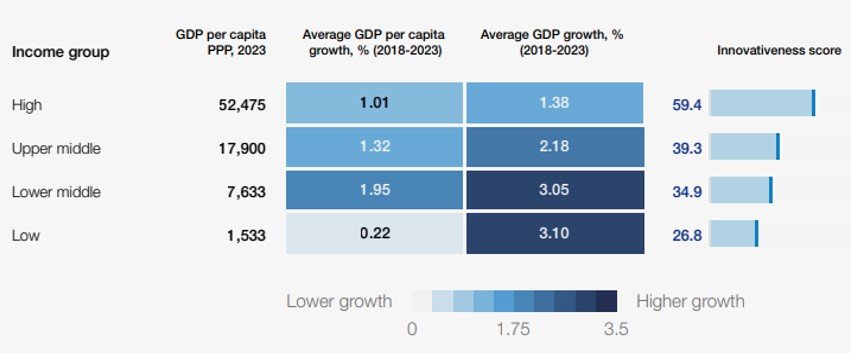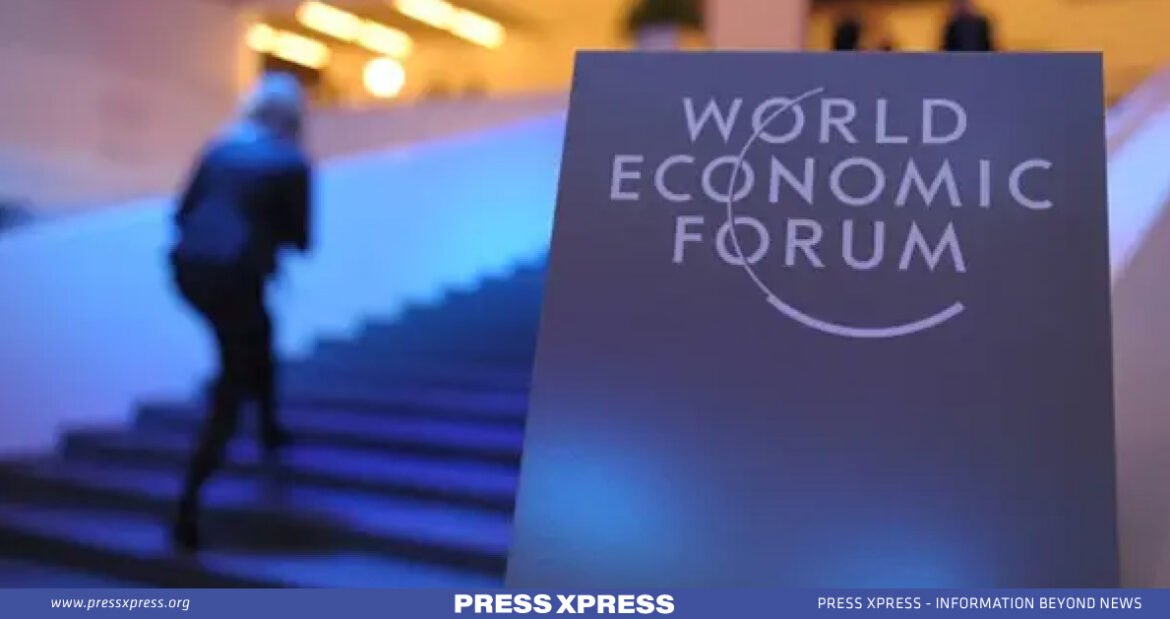Key Highlights:
- Global growth has slowed; revitalizing it is crucial to tackle impending challenges.
- WEF evaluated 107 economics based on four pillars; inclusiveness, resilience, sustainability, and innovativeness
- by 2030, growth rates could fall to their lowest in 30 years
- GDP growth has declined from more than 2% to less than 1.5% in advanced economies
A recently published report from the World Economic Forum reevaluates global economic growth by introducing a comprehensive framework that evaluates GDP alongside the quality of growth across 107 economies. The Future of Growth Report 2024 underscores a significant economic slowdown projected to hit its lowest point in three decades by 2030, amidst ongoing economic and geopolitical disruptions. This downturn is intensifying a network of interconnected global challenges, including the climate crisis and a weakening social contract, collectively undermining progress in global development.
The report notes that since the onset of the 2007 financial crisis, there has been a discernible deceleration in global growth. On average, GDP growth has diminished, dropping from over 2% in advanced economies and nearly 6% in emerging and developing economies during the early 2000s to less than 1.5% and less than 2%, respectively, in the post-COVID era. This deceleration is compounded by a series of crises—geopolitical, financial, and environmental—that have not only raised doubts about the efficacy of existing approaches to stimulating economic growth but have also prompted a reevaluation of the underlying goals and values.
While presenting the report, Saadia Zahidi, Managing Director of the World Economic Forum, said, “Reigniting global growth is crucial to addressing key challenges, but growth alone is insufficient.” The report advocates for a new approach to evaluating economic growth that finds a balance between efficiency and long-term sustainability, resilience, and equity, while also fostering innovation for the future. This approach aligns with both global and national priorities.

World Outlook
Many economies are experiencing growth patterns that lack sustainability and inclusivity, and they face limitations in their capacity to foster innovation while minimizing their vulnerability to global shocks. According to the report’s comprehensive assessment of GDP and growth quality across 107 economies, high-income economies exhibit commendable performance in innovation and inclusion, whereas lower-income economies excel in sustainability. Notable achievements within the lower-middle-income bracket include high sustainability scores for India and Kenya, innovativeness for Jordan, inclusiveness for Vietnam, and resilience for the Philippines.
A set of common challenges impedes a more robust and balanced growth performance among these economies, encompassing issues such as technology absorption, inadequate social safety nets, insufficient investment in renewable energy, and a lack of capacity in healthcare systems.
The report underscores a significant economic slowdown, projected to reach its lowest point in three decades by 2030, exacerbated by ongoing economic and geopolitical shocks. This downturn amplifies a spectrum of interconnected global challenges, including the climate crisis and a deteriorating social contract, collectively reversing progress in global development.
On an individual level, none of the 107 economies covered in the report achieved a score higher than 80 on any of the framework’s four dimensions.

Growth Profiles
In 2023, high-income economies, with an average GDP of $52,475 per capita (at purchasing power parity), demonstrated an average annual GDP per capita growth of 1.01% over the past five years (2018-2023). Notable countries in this group include Australia, Canada, France, Germany, Italy, Japan, Saudi Arabia, South Korea, the United Kingdom, and the United States, with noteworthy high scores in various dimensions.
These dimensions include Switzerland (80.4), Singapore (76.4), and the United States (74.1) in innovativeness; Finland (77.7) and Canada (75.8) in inclusiveness; Sweden (60.9), Germany (56.3), and the United Kingdom (54.0) in sustainability; and Australia (69.5) and Japan (66.3) in resilience. Despite commendable scores, challenges hindering more robust and balanced growth in this group include talent availability, equal workplace opportunities, slow development and adoption of green technologies, and insufficient reskilling and lifelong learning initiatives.
Moving on to upper-middle-income economies, with an average GDP of $17,900 per capita in 2023, their average annual GDP per capita growth over the past five years was 1.32%. Countries in this category, such as Argentina, Brazil, Indonesia, Mexico, South Africa, and Türkiye, emphasize inclusiveness (54.8) and resilience (50.0), with opportunities for enhancement in sustainability (44.0) and innovativeness (39.3).
Notable high scores include Malaysia (52.3) and South Africa (44.1) in innovativeness; Brazil (56.0) and Costa Rica (48.8) in sustainability; and Indonesia (57.9) in resilience. Common challenges for this group include issues such as research capacity, wealth and income inequality, high non-renewable energy intensity, waste production, and financial stability.
Lower-middle-income economies, with an average GDP of $7,633 per capita in 2023, exhibited an average annual GDP per capita growth of 1.95% over the past five years. Countries in this group, including Bangladesh, Egypt, India, Nigeria, Pakistan, the Philippines, and Viet Nam, focus on resilience (45.8), with higher sustainability scores (50.0) compared to richer economies. However, there is room for improvement in inclusiveness (44.8) and innovativeness (34.9).
Notable high scores include Jordan (45.1) in innovativeness; Viet Nam (56.2) in inclusiveness; Kenya (57.2) and India (56.0) in sustainability; and the Philippines (54.1) in resilience. Common challenges hindering a stronger and more balanced growth performance for this group involve issues like technology absorption, lack of social safety nets, insufficient investment in renewable energy, and inadequate healthcare system capacity.

(Source: World Economic Report 2024)
Lastly, low-income economies, with an average GDP of $1,533 per capita in 2023, reported an average annual GDP per capita growth of only 0.22% over the past five years. Notably, Rwanda achieved high scores, particularly emphasizing resilience (52.8). However, challenges faced by low-income economies include issues related to ICT capital and connectivity, access to connectivity and healthy nutrition, insufficient environmental regulation, and limited energy source diversification.

(Source: World Economic Forum, Future of Growth Report 2024; GDP data based on IMF World Economic Outlook, October 2023)
In recent times, the fragility of the world’s shared prosperity has become apparent. The path of economies, societies, and communities is currently being examined, influenced by the decisions made in the present. While appropriately addressing immediate challenges has garnered significant attention, it is vital to remain committed to medium- and long-term perspectives. As policymakers navigate an increasingly complex and turbulent global landscape, there is an urgent requirement for comprehensive, collective, and coordinated action. These measures are indispensable not only for preserving current achievements but also for shaping a more promising future.


